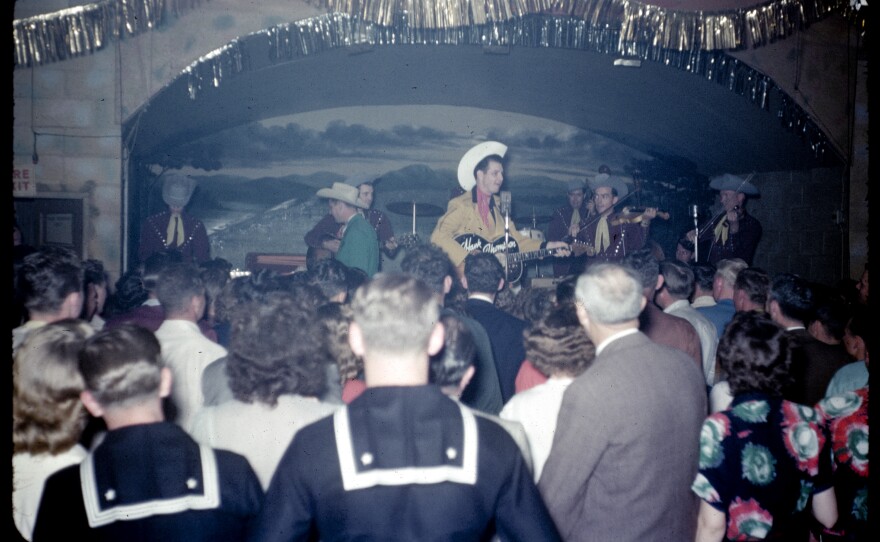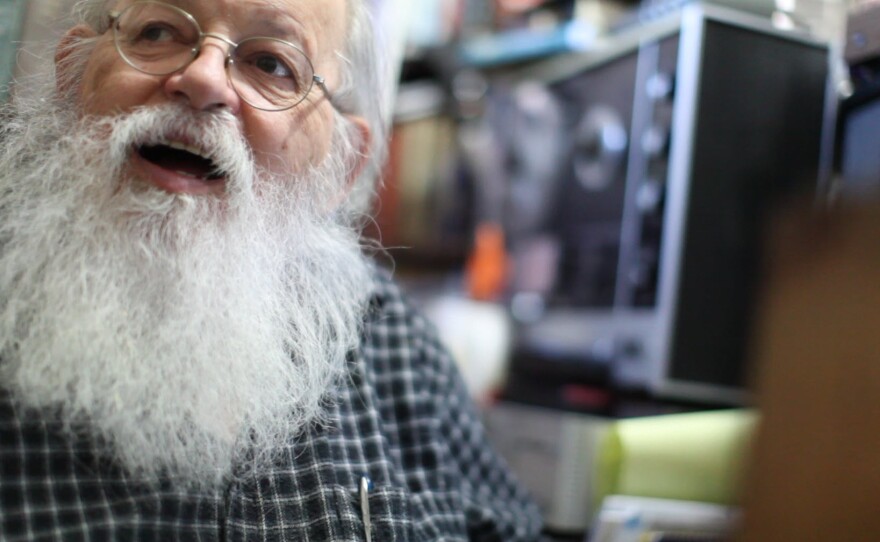Among stacks of records, VHS tapes and reel-to-reel recordings in the home that Lou and Virginia Curtiss shared for decades is a certificate that reads: South Bay Youth for Kennedy. Lou’s signature is scrawled on the bottom as a charter member.
The year was 1960, John Kennedy was running for president, and Lou was looking to get into politics. But he would later do something perhaps more radical.
Lou opened a shop dedicated to folk music — in San Diego.
Lou died in July at age 79, after owning Folk Arts Rare Records with Virginia for 47 years. He inspired the likes of Tom Waits and Jack Tempchin, who wrote songs for the Eagles. He sold records to RuPaul and Joan Baez. He organized 56 folk festivals and coaxed music legends out of retirement to play them.
And on Sunday, Lou will accomplish yet another feat: bringing people together to hear music at the former Bostonia Ballroom, now the Royal Palace Banquet Hall.
Brendan Boyle, who now owns Folk Arts, is organizing a music festival there in honor of Lou. At age 12, Lou saw Hank Williams perform at the Bostonia and had always wanted to bring music back to the historic venue, Boyle said.
“It was kind of a wild place with sailors and drinking,” Boyle said. “He was just a little kid taking it all in, loving the music.”

Lou moved to Imperial Beach with his family as a child and quickly became immersed in the '50s country music scene. He bought his first record at a drugstore down the street and later convinced the doorman at Club 21 in National City, another rowdy sailor bar, to let him stand in the kitchen doorway to watch bands play.
When Virginia met Lou in 1966, he was manning the Folk Song Society table at freshman orientation at San Diego State.
“So the first person I actually stood around and talked to was Lou,” she said. “Basically, he was hustling people to be in the club. So I went, and at those club meetings, Lou would bring a record player and a stack of his records and he’d say, ‘This is a really fine cut,’ and he’d put another song on. Basically, he was doing what later he did as a radio show.”
Lou would later host a weekly show on KSDS FM 88.3.

By the time Lou opened his shop in 1967, the city’s country and folk music venues were closing, one by one. He was bent on capturing every bit of the scene he could and cramming them into his tiny shop — recordings, ephemera, even the artists themselves with live performances.
“You’d have to search through a stack of 78s that you thought was holding up his room at one point,” said musician Gregory Page. “And you’re thinking, is this thing going to come down on me? Because it was really held together by all of this shellac and vinyl, this crickedy, old record shop.”
Page started going to Folk Arts in the '90s to discover new music and found a mentor in Lou.
“If you ever needed to find where Gregory Page was, and he wasn’t answering his phone, and he wasn’t at home, he was probably at that record shop,” he said. “I spent a lot of time there with Lou. And there was a lot of stories, but mostly there was a lot of listening and letting the music tell the story.
“That’s what brought Lou so much gratification and so much joy, to be able to share this music with whoever was there listening," Page said. Footage he shot of one of these listening sessions shows Lou with a constant smile, his eyes studying Page's reaction before settling into a joyful gaze.

Page said that sharing was a political act, in and of itself — an outlook born out of the labor and civil rights movements, and put into the songs Lou loved.
“There’s an inclusiveness in folk music that I’ve always been fascinated with — I mean the whole, join hands and let’s sing along,” Page said.
Virginia saw that in him, too.
“He never managed to charge the going rate — on anything. The idea was that music, in particular, was meant to pass around.
At the new Folk Arts on El Cajon Boulevard, Boyle put the needle on a record from the Maddox Brothers and Rose — one of the groups Lou watched from the kitchen at Club 21. He launched into a story.
“In the 1980s, Lou gets a tip where the lead singer of this group is living up in Oregon, Rose Maddox,” he said. “She hasn’t performed music in decades. He contacted her, visited with her, started a correspondence and encouraged her to revive her career.
“She was getting up there in age. She thought nobody cared, and many people didn’t. But a lot of people did care, and the person that cared the most was Lou Curtiss,” Boyle said.
Lou eventually convinced Maddox and other aging musicians to play festivals and record new music — arguably another political act, amid MP3 downloads and polished pop stars.
“Lou was the type of person that reminded these people that they were important and they were appreciated,” Boyle said.

While the new shop offers much more than folk, a headshot of Maddox, made out to Lou, remains alongside much of the ephemera Lou collected over his career.
“Only Lou Curtiss is Lou Curtiss,” Boyle said. “But I certainly have a job to honor him because I love him and respect him so much.”
Lou was digitizing his collection for UCLA when he died from complications of a stroke this summer.
Lou’s wife Virginia is interested in continuing that work, but for her, the bigger task right now is taking over as the family’s archivist.
“It occurred to me recently that I now know jokes that nobody else knows, because there were things that only Lou and I said, you know, the warping of language that you do,” she said.
The Lou Curtiss Remembrance and Celebration will feature an open mic-style music festival and presentations on San Diego’s country music history, beginning at 4 p.m.
This is PBS midday edition. I'm Maureen Cavanagh musicians and music fans will gather in alcohol Sunday to celebrate the life of Luke Curtis the music promoter and archivist died in July at the age of 79. Hey PBS reporter Megan Burks has this look at a life that inspired legendary artists and music lovers alike. + 00:12:49 This is what's behind those 78. + 00:12:52 Among stacks of records VHS tapes and reel to reel recordings in the home that Lou in Virginia Kurdish shared for decades is the certificate that reads South Bay Youth for Kennedy Lew's signature is scrawled on the bottom as a charter member. The year was 1960 John Kennedy was running for president and Lou was looking to get into politics. + 00:13:13 He was an assistant to the committee that put together the plan for education under Pat Brown. Governor Pat Brown Jerry Brown's father and that was the one that made the colleges more or less integrated after Kennedy's assassination. + 00:13:25 Lou decided to do something perhaps more radical than enter politics. He opened a shop dedicated to folk music in San Diego. + 00:13:33 We never managed to charge what something was getting the going rate on anything. + 00:13:39 The idea was that you know music in particular was meant to pass around in Virginia ran Fulk arts rare records in Little Italy and later Normal Heights for forty seven years. Bearing witness to the rise and eventual fall of the 1960s folk scene as music venue shattered one by one Luas bent on capturing that scene and cramming it into his tiny shop. + 00:14:01 You'd have to search through a stack of 78 that you thought was holding up his room at one point like you'd think this is hoping going to come down only because it was really held together by by all of this slack and vital. You know this is creakily old record shop singer.






